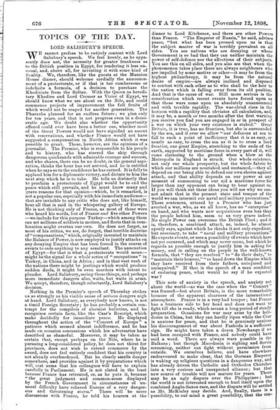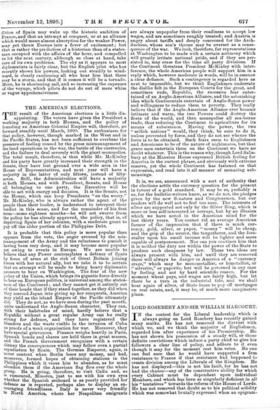TOPICS OF THE DAY.
LORD SALISBURY'S SPEECH.
WE cannot profess to be entirely content with Lord Salisbury's speech. We feel keenly, as he appa- rently does not, the necessity for greater frankness as to the British position in Egypt, for rendering it less un- usual, and, above all, for investing it with some kind of finality. We, therefore, like the guests at the Mansion House dinner, should welcome cordially the announce- ment of a protectorate, or if that is too cumbersome or indefinite a formula, of a decision to purchase the Khediviate from the Sultan. With the Queen as heredi- tary Khedive and Lord Cromer as Vizier of Egypt, we should know what we are about on the Nile, and could commence projects of improvement the full fruits of which would not be reaped for another generation. The Pharaohs planned for an endless future ; we plan only for ten years. and that is not progress even in a demo- cratic age. We doubt also whether the opportunity offered could ever have been a better one, whether most of the Great Powers would not have signified an assent with reservations, and whether France would not have suggested a compensation in North Africa which it was possible to grant. These, however, are the opinions of a journalist. The Premier, who is responsible to his people and to history, who has steered the ship through dangerous quicksands with admirable courage and success, and who shares, there can be no doubt, in the general aspi- ration, thinks the hour has not arrived, and he is entitled when he says so to the confidence he has earned. It is folly to applaud him for a diplomatic victory, and dictate to him the next step which he is to take. He tells us distinctly that to proclaim a protectorate of Egypt would be to end the peace which still prevails, and he must know many and grave reasons for that opinion—which, be it remarked, is not a popular one, especially with his immediate audience— that are invisible to any critic who does not like himself, hear all that is said in the whispering gallery of Europe. He is not thinking only of France, as most of those were who heard his words, but of France and five other Powers —we include for this purpose Turkey—which among them can set millions of soldiers in motion, and fleets that in com- bination might overtax our own. He does not forget, as most of his critics, we see, do forget, that terrible doctrine of "compensations," which, originally invented to maintain the Balance of Power, is now employed to justify attacks on any decaying Empire that has been forced in the course of events to cede anything to any assailant. The annexation of Egypt—for that is what a protectorate would mean— might be the signal for a whole series of " occupations " in Turkey, in China, and in Africa ; and in that vast rush of the nations there might be jostlings which would produce sudden duels, it might be even murders with intent to plunder. Lord Salisbury, seeing these things, and perhaps more immediate dangers also, waits, but waits in arms. We accept, therefore, though reluctantly, Lord Salisbury's decision.
Nothing in the Premier's speech of Thursday strikes us so strongly as his visible sense of serious dangers nigh at hand. Lord Salisbury, as everybody now knows, is not a timid Foreign Secretary ; he has probably a certain con- tempt for the compilers of alarmist bulletins, and he recognises certain facts, like the Czar's Rescript, which make decidedly for immediate peace. He displayed throughout the action of the "Concert of Europe" a patience which seemed almost indifference, and he has made on occasion concessions which his adversaries have described as shameful. Moreover, it may be taken as certain that, except perhaps on the Nile, where he is pursuing a long-considered policy, he does not thirst for provinces, does not wish to extend commerce by the sword, does not feel entirely confident that his country is not already overburdened. But he clearly smells danger somewhere, aid provides against it by preparations which will cost sums that his colleagues will have to explain carefully in Parliament. He is not elated in the least because France has retreated, or, as he puts it, because "the great judgment and common-sense displayed by the French Government in circumstances of un- usual difficulty have relieved Europe of a very danger- ous and threatening storm." There will be more discussions with France, he told his hearers at the dinner to Lord Kitchener, and there are other Powers than France. "The Emperor of Russia," he said, advises peace, "but what has been pressed upon us is that the subject matter of war is terribly prevalent on all sides. You see nations who are decaying or whose Government is so bad that they can neither maintain the power of self-defence nor the affections of their subjects You see this on all sides, and you also see that when the phenomenon takes place there are always neighbours who are impelled by some motive or other—it may be from the highest philanthropy, it may be from the natural desire of empire—are always inclined and disposed to contest with each other as to who shall be the heir to the nation which is falling away from its old position. And that is the cause of war. Still more serious is the consideration which recent events have forced upon us that these wars come upon us absolutely unannounced and with terrible rapidity. The war-cloud rises in the horizon with a rapidity that obviates all calculation, and, it may be, a month or two months after the first warning you receive you find you are engaged in or in prospect of a war on which your very existence is staked." Great Britain, it is true, has no frontiers, but she is surrounded by the sea, and if ever we allow "our defences at sea to fall to such a. point of inefficiency that it is as easy, or nearly as easy, to cross the sea as it is to cross a land frontier, our great Empire, stretching to the ends of the earth, supported by maritime force in every part of it, will come clattering to the ground when a blow at the Metropolis in England is struck. Our whole existence, not only our whole prosperity, but the whole fabric by- which our millions are nourished and sustained,—they all depend on our being able to defend our own shores against attack, and that ability depends on our power at any moment of summoning to our aid a maritime force far larger than any opponent can bring to bear against us. If you will think out these ideas you will see why we can- not admit that in the present state and temper of the world we can intermit our naval and military precautions." Those sentences, uttered by a Premier who has just averted a war, who, as we all know, has no "enterprise" on hand, and who wants new acquisitions even less than the people behind him, seem to us very grave indeed.. No single Power can overcome the British Fleet ; and it is, therefore, a combined attack, as, indeed, he almost openly says, against which he thinks it not only expedient, but necessary, to take "naval and military precautions.' He expects events, or sees a possibility of events which have not yet occurred, and which may never occur, but which he regards as possible enough to justify him in asking for money, and in calling on the people in the well-known formula, that "they are resolved" to "do their duty," to "maintain their honour," "to hand down the Empire which they have received from their fathers, uninjured and unimpaired." If that is the speech of a man confident of enduring peace, what would he say if he expected war ?
This note of anxiety in the speech, and anxiety not about the world—as was the case when the "Concert" was framed—but about Britain, is the more remarkable because of the apparent clearness of the international atmosphere. France is in a very bad temper ; but France has a business side to her head and does not want to. fight till she is ready, which means a long period of steady preparation. Occasions for war may arise by the halt- dozen in China, but they can hardly ripen while the Czar is anxious for peace, and that he is genuinely anxious his discouragement of war about Fashoda is a sufficient sign. He might have taken a dozen Newchangs if we had been occupied with France, and nobody could have said a word. There are always wars possible in the Balkans ; but though Macedonia is sighing and Serna screaming, neither can fight without permission from outside. We ourselves believe, and have elsewhere endeavoured to make clear, that the German Emperor is waking up religious questions in a dangerous way, and- has already driven the Catholic and Orthodox Churches. into a very curious and unexpected alliance ; but that new source of trouble will not mature for years. There may be an ugly dispute over the Philippines ; but the world is not interested enough to hurl itself upon the combined Anglo-Saxon race, and. the dispute will be settled as Mr. McKinley may decide. And, finally, there 18 possibility, to our mind a great possibility, that the non- dition of Spain may wake up the historic ambition of France, and that an attempt at conquest, or at an alliance which would mean almost absorption for the weaker Power, may yet throw Europe into a fever of excitement ; but that is rather the prediction of a historian than of a states- man occupied with the affairs of the hour, and compelled to let the next century, although so close at hand, take care of its own problems. The sky as it appears to most diplomatists is fairly clear, but the English pilot who has recently shown his powers, looking out steadily to wind- ward, is clearly cautioning all who hear him that there may be a storm, and that if it comes it will be a tornado. More, he is shortening sail, and so increasing the expenses of the voyage, which pilots do not do out of mere whim or vague apprehensiveness.







































 Previous page
Previous page